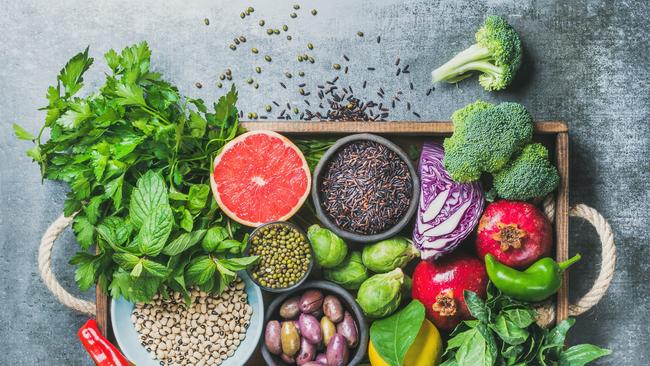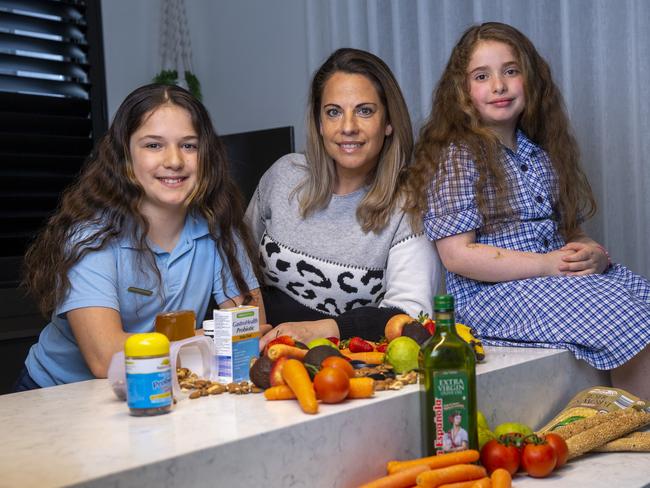Gut bacteria could be the key to controlling hay fever, asthma, eczema and food allergies
Managing hay fever, asthma, eczema and dangerous food allergies could be as simple as making one key change to your diet, a groundbreaking new study has found.

Illness
Don't miss out on the headlines from Illness. Followed categories will be added to My News.
Exclusive: Controlling hay fever, asthma, eczema and other allergies could be as simple as including more fibre in your diet.
New research has found gut bacteria interacts with immune and inflammatory cells that cause allergies, which affect one in three Australians.
Molecular nutritionist from the University of Newcastle Dr Emma Beckett said changing your diet to dampen down these inflammatory cells can help manage these conditions.
“I mean, obviously I’m not saying that this replaces taking your hay fever medication or using your asthma puffer,” she said.
“There is some really good evidence now from both human models, and mouse models, showing that doing things that keep the gut healthy reduces the inflammatory responses in other parts of the body including the nose, including the lungs and the skin.”

Separate research published this year found people who have hay fever have a less diverse range of bacteria in their gut and an abundance of particular types of bacteria.
Another study found for every increase in the amount of inflammatory foods people consumed, like sugar, saturated fat and refined carbohydrates, the odds of them having asthma increased by 70 per cent.
Dr Beckett said to improve the diversity of gut bacteria people with allergies needed to eat more fibre, because good bacteria live off fibre.

Fancy Instagrammable prebiotics or supplements for good gut health were not necessary. Normal pantry foods including wholegrain breads, and fruits, vegetables, seeds and legumes were better, she said.
Each type of good bacteria in your gut has its own preferred fibre so eating a wide variety of fruits and vegetables, nuts and seeds, legumes, is essential.
“Don’t go doing things that are going to damage the gut bacteria like drinking too much alcohol, smoking or eating high fat, high calorie diets,” she warned.

Asthma Australia chief Michele Goldman said more research was needed in understanding the influences of a gut microbiota but her organisation encouraged a healthy diet.
Professor Mimi Tang from the Murdoch Children’s Research Institute said that pregnant women who carried certain types of gut bacteria had children with a reduced risk of food allergies.
“There are studies to support its critical role in preventing allergies but understanding its role in reversing established disease is still under study,” she said.
Professor Tang said eating resistant starch gained from cooked rice that had been cooled down, artichokes, onions and green bananas helped feed the right type of gut bacteria.
Allergy and Anaphylaxis Australia chief Maria Said noted cleaner childhood environments were reducing children's’ exposure to bacteria, some of which could protect them from developing allergies.

Melbourne mum Yvonne Michael makes a big effort to feed her children Giselle, 10, and Chloe, 7, anti-inflammatory foods to help control their asthma.
“I give them a probiotic but also specific foods — almond honey and cinnamon to help reduce that inflammation, so, this is right up my alley.” she said.
Her daughters also eat legumes like lentils at least once a week as well as cucumber and tomatoes.
“I’ve seen them every single year have a need for medication less and less, I think there’s definitely a link.” she said.
When Giselle was a toddler the family had to get a by ambulance to race her to hospital.
“It was really scary, so I thought that I need to change everything here,” she said.
Sydney mum Clare Elsworth said she was aware of the importance of gut bacteria in health and had sourced a dairy free probiotic for her 10-year-old son Isaac who suffers anaphylactic reactions to dairy, nuts and sesame seeds.
A friend had helped her son through asthma by changing his diet, she said.
However, she believes there is a genetic cause for her son’s anaphylaxis which runs in her family and she has to be extremely careful about what he eats.
Isaac has never had a lunch order, takes his own food to birthday parties and has to be careful not to touch friends who have eaten foods he is allergic to.
In Australia, 3.1 million people have hay fever, 2.7 million have asthma and 800,000 people have eczema.
MORE NEWS
Ex-horror aged care home boss awarded $920,000 contract

